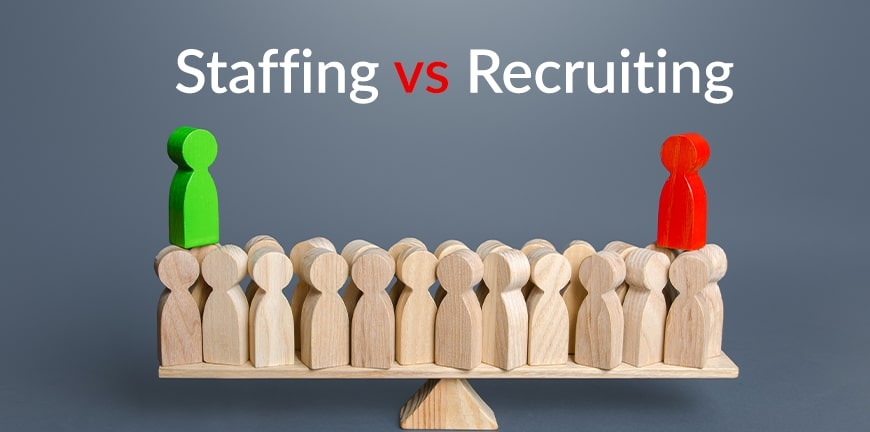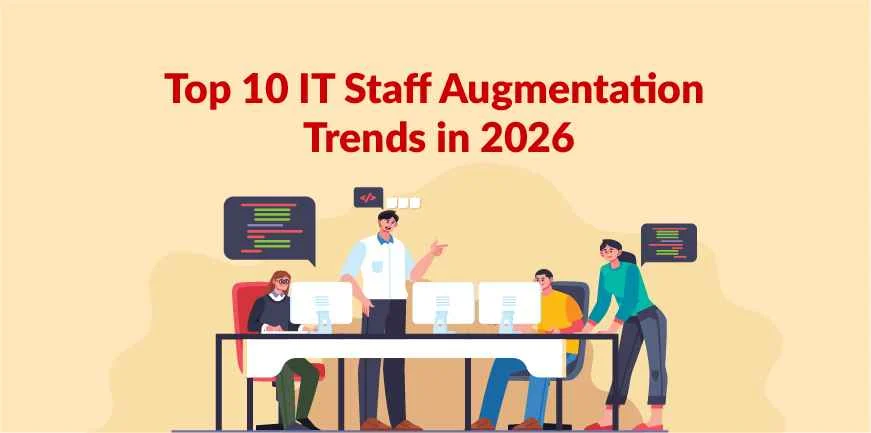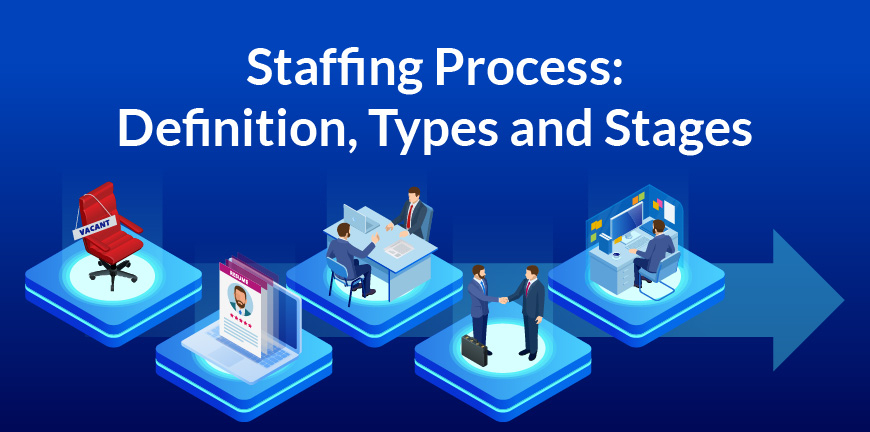
Top 15 Employee Retention Strategies for 2026
08/01/2026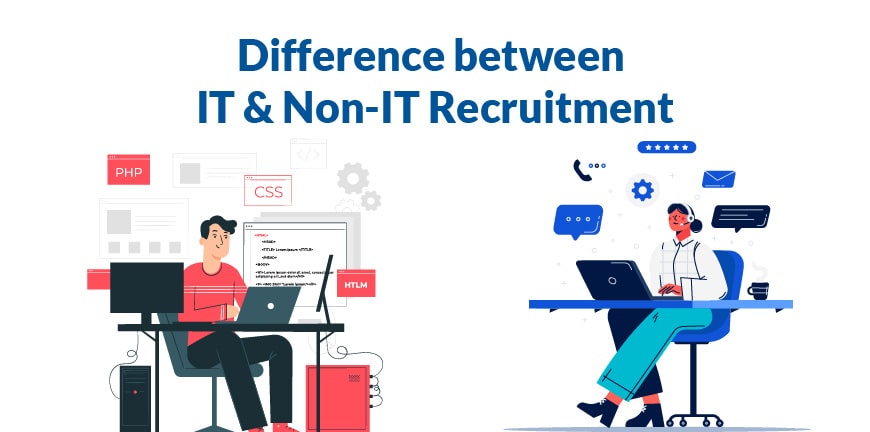
Difference Between IT and non-IT Recruitment
09/01/2026- What is Staffing?
- What is Recruitment?
- Staffing Vs. Recruitment: What are the Key Differences?
- What are the Common Staffing Methods used Today?
- 9 Different Types of Staffing Methods
- What are the Common Recruitment Methods in 2026?
- What are the Top 4 Objectives of Staffing?
- What are the Top 4 Objectives of Recruitment?
- Closing Words
- Key Takeaways
- Frequently Asked Questions(FAQs)
In a world that is moving fast by the day, the job market is evolving rapidly, and building a robust team is of utmost importance. The high-voltage competitive market requires appropriate individuals to fit into organizational moulds and drive growth and innovation. This can happen with the help of two crucial processes, recruitment and staffing.
Both processes aim to acquire and manage suitable talent; however, they serve pronounced purposes within a broader structure of Human Resource Management. Organizations must comprehend the difference between the two functions and formulate manpower strategies that would meet the current and long-term purposes of businesses.
Let us dive into a detailed distinction and understand the types, objectives, etc, of staffing and recruitment.
What is Staffing?
Staffing refers to the selection, evaluation, and hiring of individuals in a company to serve current or temporary needs. The main goal of staffing is to populate the ranks in a company with the right individuals at the right positions for a specific period.
What is Recruitment?
Actively seeking out, shortlisting, responding to, and then hiring candidates for a specific job or role for a permanent position is referred to as recruitment. In the process of recruitment, recruiters review several hundred resumes, attempting to match the skills mentioned to those required by the employer, shortlisting those eligible, and then evaluating them based on their knowledge, skills, and behavior.
Staffing Vs. Recruitment: What are the Key Differences?
| Aspect | Staffing | Recruitment |
| Definition | The process of hiring and managing employees to fill both temporary and permanent roles within an organization. | The process of identifying, attracting, and selecting qualified candidates to fill specific job vacancies. |
| Scope | Broader — includes workforce planning, hiring, training, and retention. | Narrower — focuses mainly on finding and hiring candidates. |
| Objective | To maintain an optimal number of employees to meet organizational goals. | To fill specific open positions efficiently and effectively. |
| Duration | Can be short-term (temporary staffing) or long-term (permanent staffing). | Generally short-term — ends once the vacancy is filled. |
| Focus | Workforce management and placement (temporary or permanent). | Candidate sourcing, screening, and selection. |
| Approach | More strategic and continuous — involves planning for future workforce needs. | More tactical and reactive — responds to immediate hiring needs. |
| Involvement | Managed by HR departments or staffing agencies that may provide temporary workers. | Managed by recruiters or recruitment agencies focusing on talent acquisition. |
| Outcome | Ensures the right number of employees are in the right roles at all times. | Ensures qualified candidates are selected for specific job openings. |
What are the Common Staffing Methods used Today?
Staffing and recruitment are two sides of the same coin, but there are differences between staffing and recruitment, and the different methods under each help to set them apart. Let us look at the different processes now:
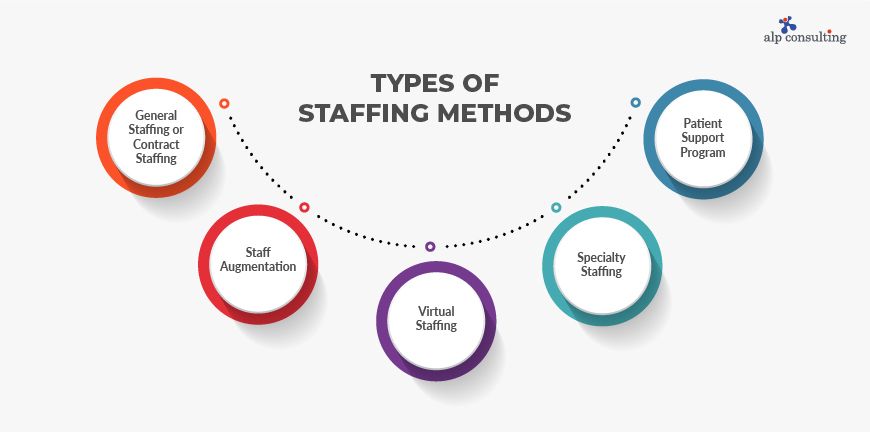
9 Different Types of Staffing Methods
The different solutions that staffing and recruitment firms generally provide for understaffing are:
1. Permanent Staffing
This is the kind of staffing where organizations recruit professionals with the intention of retaining them permanently and keeping them long-term. Organizations resort to permanent staffing solutions when they require individuals to perform daily tasks and responsibilities.
According to reports, 45% of employers plan new permanent hires in FY26.
2. Temporary Staffing
Temporary staffing involves the hiring of professionals for short-term requirements. For example, if there is a sudden or seasonal requirement, a specialized need for a specific project, specific organizational demands to be met, etc.
A report suggests 26% of employers focus on temporary, contract, and project-based roles in FY26.
3. Freelance Staffing
This type of staffing refers to companies hiring independent workers to complete a specific task or project-based work. The work could be creative writing, design, marketing, or e-commerce platforms, etc.
4. Part-Time Staffing
For this kind of staffing, organizations hire professionals only for a few hours and do not offer them full-time schedules. Sectors like hospitality, retail, education, healthcare, etc, mostly adopt this type of staffing method.
5. General Staffing or Contract Staffing
Bigger companies have short-term, contractual requirements that need to be fulfilled quickly. A general or contract staffing company can move quickly to fulfill such a need. Employees hired in temp staffing roles may be converted into full-time employees later.
6. Staff Augmentation
The outsourcing of manpower that is based on a skill requirement or for the completion of a specific project, where one or more candidates are added to a team to execute certain tasks, is called staff augmentation. As an employer, you will be managing the members of your extended team, deciding how they will be onboarded and trained.
7. Virtual Staffing
Virtual assistance is an integral part of business planning and growth in companies today. Even key positions in companies are being held by remote staff. Virtual staffing contributes to increased productivity (for a few individuals), saves the cost of infrastructure and time, and is proven to contribute to a company’s growth.
8. Specialty Staffing
Finding the right candidate can be a difficult job. The candidate needs to be unique and qualified, meet the skills required for the job, and be the right cultural fit for the organization they will be joining. Generally, specialty staffing is for niche roles such as those in legal firms or accounting firms, which only a chosen few get into.
9. Patient Support Program
A patient support program is also referred to as a patient solutions, patient services, or a patient assistance program. An increasing number of patients are being enrolled in patient support programs, given the growth of remote monitoring and digital therapeutics. Pharmaceutical companies want to improve the patient journey, but following up on each patient can be a difficult task, which is why most of them outsource patient support.
What are the Common Recruitment Methods in 2026?
The different methods in recruitment that staffing and recruiting companies generally offer are:
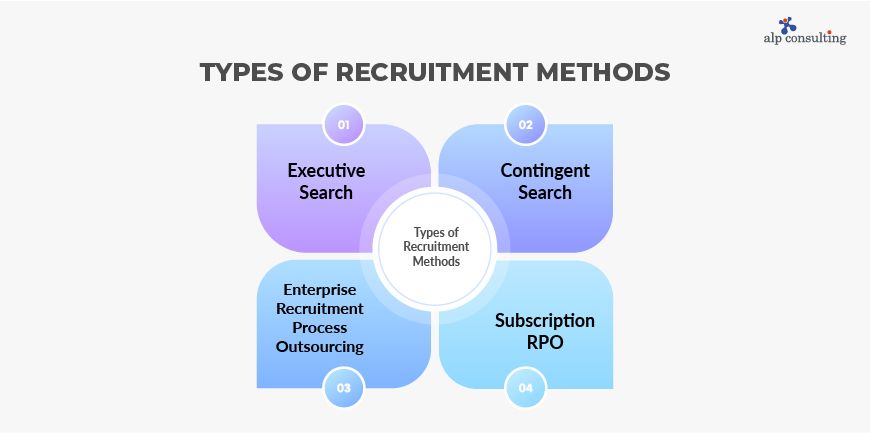
1. Online Job Portals
This recruitment method involves posting open job positions on several relevant job portals, other platforms, and websites to get in touch with a wide talent bank across locations.
2. Social Media Recruitment
With social media gaining traction, job seekers are increasingly invested in the evolving social media trends, and organizations post job openings on social media platforms to draw and retain professionals from diverse backgrounds and places.
3. Employee referrals
This method encourages the current employees and workforce to refer skilled and suitable professionals to join the organization to cater to various job positions. Employee referrals usually involve incentives.
4. Executive Search
Leaders drive an organization forward with their breakaway thinking. Members of the C-suite, such as CEOs, CTOs, CXOs, and CFOs, are crucial to building a great company. The heads of management in senior roles such as GMs, VPs, and AVPs, and other niche leadership roles, are hired under executive search. Executive search takes anywhere between 6 to 8 weeks for selection and 7 to 12 weeks for a hire after interviews and screening.
5. Contingent Search
A contingent search generally happens for individual contributor roles, with a search and recruiting firm being paid only after the successful placement of the candidate in the company. There is generally a placement guarantee of 30 days as well. If the company or firm does not satisfy the condition, then the contract is void.
6. Enterprise Recruitment Process Outsourcing
In enterprise recruitment process outsourcing, the entire process of recruitment process is outsourced. This involves not just hiring and selection, but also onboarding. Such outsourcing is very useful for large companies that want to outsource the recruitment processes in a particular geographic region, division, or department.
7. Subscription RPO
In subscription RPO, the recruitment process outsourcing happens in a very flexible and scalable manner. A company need not be a large one to go for an RPO solution. In fact, companies can now subscribe to an RPO solution with a pay-as-you-go model, where the costs are reduced, and quality is still assured.
Alp Consulting, a leader in HR consulting, provides a subscription RPO solution, referred to as Rekpro, where organizations can pay monthly for an RPO solution without having an in-house HR team.
What are the Top 4 Objectives of Staffing?
Let us look at some of the vital objectives of staffing:
1. Ensure the Right Talent for the Right Job
The purpose is essentially to match and fit candidates based on their skills and qualifications and align them to specific job roles and organizational goals.
2. Meet Workforce Needs
It focuses on recruiting the correct number of individuals in each department to cater to the company’s objectives. There are diminished workflow disruptions as vacancies are filled promptly.
3. Attain Organization Efficiency
Competent employees and skilled professionals are placed in suitable job roles, accelerating processes and enhancing the performance of organizations.
4. Reduce Employee Turnover
There is an improved rate of satisfaction amongst employees as they are happy with their roles, leading to higher attrition rates.
What are the Top 4 Objectives of Recruitment?
Let us now check out some fundamental objectives of Recruitment:
1. Spot and Attract Skilled Candidates
The primary goal of recruitment is for recruiters to search for and find the right and qualified candidates with the required expertise to cater to the demands and needs of organizations.
2. Enhance the Hire Quality
Recruitment is done to bring skilled employees to the table who would contribute to the growth and productivity of an organization. They would also align properly with the company culture and values.
3. Cater to Current and Future Workforce Needs
Recruitment is a process in which a proper analysis of the workforce requirements is done based on business plans and forecasts, ensuring that the right individuals are selected to meet existing and future needs.
4. Alignment with Organizational Objectives
Recruitment ensures that the individuals recruited cater to the long-term goals of the organization and contribute to the strategic development and progress in the long run.
Closing Words
Recruiting and staffing are well managed by an HR consulting firm, so you can opt for either as per your needs and the time. But an HR consultancy such as Alp Consulting goes beyond just recruitment and staffing and offers several other solutions, such as payroll management, tax filing, and compliance management.
If you have any recruiting or staffing needs to be taken care of or any other issue related to HR, please get in touch with Alp Consulting today.
Key Takeaways
- Staffing is a broader process than recruiting.
- Recruitment is about finding talent; staffing manages it.
- Different methods cater to different business needs.
- Clear objectives guide both processes.
- Partnering with HR experts enhances efficiency.
Frequently Asked Questions(FAQs)
1. What is the difference between a recruiting firm and a staffing agency?
A recruitment firm is an agency that handles requests for sourcing candidates for full-time, permanent job roles. A staffing agency generally procures candidates for temporary or contract roles on behalf of employers.
2. What is the staffing and recruiting industry?
Staffing and recruiting are two main terms in the talent sourcing and management industry. Staffing is different from recruitment because it generally addresses a short-term, contractual need, and recruitment addresses a full-time, permanent need for a company.
Staffing is preferred for immediate requirements over recruitment. Modern recruiting and staffing agencies like Alp Consulting handle both of these tasks efficiently.
3. Is talent acquisition and staffing the same?
Talent acquisition is a term for an activity that understands the present and anticipates the future needs of the workforce, hiring skilled candidates for the future and generally long-term needs, whereas staffing is generally for temporary, short-term needs.
4. What is talent acquisition also known as?
Talent acquisition is also referred to as recruitment or strategic recruitment in some organizations. Most modern HR consultancies, such as Alp Consulting, use the term recruitment for talent acquisition.
5. Is staffing part of recruitment?
Staffing is not really a part of recruitment, but is a broader procedure that has recruitment as one of its components.
6. Which is better for companies — staffing or recruiting?
Neither staffing nor recruiting is better. The significance of these functions depends on the organizational requirements and their specific needs.
7. How has staffing and recruiting changed in 2026?
Staffing and recruiting have shifted focus towards integrating AI, with an emphasis on skill-based hiring, adoption of remote and hybrid models, etc.
Contact Us For Business Enquiry

Kasthuri R
Kasthuri R is the Co-Founder & Executive Director at ALP Consulting, bringing over 23 years of experience in search, staffing, and HR consulting. She has been instrumental in driving ALP’s recruitment, employee leasing, and executive search practices across diverse industry verticals. With deep expertise in talent acquisition, HR strategy, and operational management, Kasthuri has built scalable, client-focused solutions that enhance workforce efficiency. Her strategic leadership continues to steer ALP Consulting toward innovation and excellence in people management.

